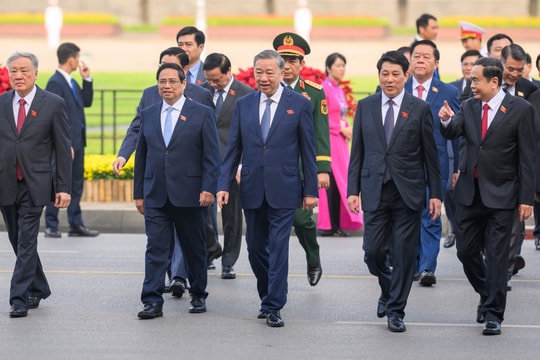Focus on solutions to steer the economy in the right direction
Discussing in groups about the socio-economic situation, the State budget estimate for 2017, and the implementation of tasks for 2018, Deputy Prime Minister Vuong Dinh Hue said the Government wishes to listen to opinions, evaluate and analyze more clearly the advantages and difficulties to direct the economy in the right direction.
|
| Deputy Prime Minister Vuong Dinh Hue (National Assembly delegate from Ha Tinh) speaks at the group discussion. Photo: VGP/Nhat Bac |
Deputy Prime Minister Vuong Dinh Hue (National Assembly delegate of Ha Tinh) said that the Report on the supplementary assessment of the implementation results of the National Assembly's Resolution on the 2017 socio-economic development plan and the results of the first months of 2018 presented by the Economic Committee at the opening session of the 5th meeting (May 21) did not accurately and objectively assess the country's socio-economic situation.
According to the Deputy Prime Minister, in the Supplementary Examination Report, the Economic Committee proposed a more specific assessment of the issue:“The Government's report data shows that the pillars of economic growth are not really sustainable; the GDP scale is still low compared to the plan for the 5-year plan 2016-2020, the growth model has not clearly transformed, the main growth driver mainly relies on oil and gas exploitation, coal, remittances and the contribution of foreign-invested enterprises; the processing industry has many contributions but only stops at the processing stage, not high technology, the ratio of added value in production value tends to decrease.
Deputy Prime Minister Vuong Dinh Hue raised the question: "Is it correct to say that growth momentum depends on crude oil and coal when in recent years, since 2016, the coal and crude oil mining industries have both experienced negative growth?"
Meanwhile, all three industrial sectors (especially processing and manufacturing), agriculture and services have grown strongly. The service sector has made remarkable progress, reaching 7.44%, the highest level since 2008, in which domestic consumption increased by double digits for the first time, contributing positively to economic growth.
Deputy Prime Minister Vuong Dinh Hue said that the Party Central Committee has already concluded on the socio-economic situation, the National Assembly has also issued a Resolution on socio-economic issues, and international organizations have also upgraded Vietnam's credit rating. And now, agencies need to supplement data and carefully analyze the causes and limitations to achieve the 2018 goals.
Deputy Prime Minister Vuong Dinh Hue also quoted the General Secretary's speech at the recent 7th Central Conference when assessing the socio-economy: "In 2017, despite facing many difficulties and challenges, our country has achieved comprehensive results in all fields. In terms of socio-economy, after many years, we have completed and exceeded 13 socio-economic targets set. GDP growth reached 6.81%, exceeding the set plan, the highest level compared to many countries in the region and the world. The macro-economy is stable, inflation is controlled at 3.53%. Major balances of the economy are ensured, budget deficit is low at about 3.5% compared to GDP, the monetary market is stable, foreign exchange reserves reached 61.5 billion USD, the stock market is flourishing... Production and business continue to recover, developing comprehensively in the three fields of industry, agriculture and services".
In addition, the Deputy Prime Minister said that the Economic Committee should analyze why the central budget deficit and local budget revenue increase. “Is it because the budget estimate is not accurate? This is the first responsibility of the Ministry of Finance and the Government, but is the auditing agency responsible? Of course, the auditing committees and the National Assembly decide on this budget estimate...”.
The Deputy Prime Minister also added: “But it is not that the local budget has increased revenue because the domestic revenue structure of some provinces has changed. Recently, the Central Government had to compensate localities with tens of thousands of billions of VND. To overcome this, the Government is asking the Ministry of Finance and localities to make estimates based on socio-economic data, not to estimate revenue and then take the increased percentage. It is also impossible to use provinces with excess revenue to compensate for provinces with deficit revenue, but the Central Government has to support localities with difficulties.”
Considering this as a suggestion on the approach in preparing the report, Deputy Prime Minister Vuong Dinh Hue hopes that the Economic Committee and the National Assembly will look at the situation objectively, in the context that the whole country is carrying out the "dual" task of both overcoming the weaknesses of the economy that have accumulated over many years and ensuring growth to help the management of the economy and society go in the right direction.
Minister of Natural Resources and Environment Tran Hong Ha (Ba Ria-Vung Tau delegation) also said that the Supplementary Review Report lacked continuity. The assessment method needs to be limited in scope, with comparison of specific indicators.
“If we talk about the situation in 2017 and 2018, those comments are not appropriate. There are problems that we see that the Central Committee has also recognized throughout the development process, and in 2016, the 5th Central Committee Conference recognized them, synchronously issuing three important issues on the private economy, state-owned enterprises, innovation of the growth model and development of the market economy - issues that have only been implemented for more than a year, so we cannot demand that the country change immediately,” said delegate Tran Hong Ha, suggesting that they must be gradually concretized through legal and policy mechanisms.
Mr. Tran Hong Ha gave an example: "With the Land Law, the National Assembly must have recommendations on policies, or the same goes for environmental protection. We propose that if this economy is developed, the environment must change. Currently, our special zones are slower than the market. When we introduce policies to develop special zones and invest in special zones, the market increases land prices and people concentrate on buying land. If public land has not changed its purpose, it is completely illegal and the locality can handle it. If the media is quick to respond, illegal land trading must have strict sanctions, then the trend will decrease. Recently, when the locality pays attention to management, it has reduced the heat of land in the special zones."
Vice Chairman of the National Assembly's Economic Committee Duong Quoc Anh (Gia Lai delegation) expressed that the Socio-Economic Review Report of the 5th Session includes the following steps: After receiving the Government's report, based on the report's content, the Resolution of the Party Central Committee, the National Assembly and on the basis of 13 criteria and indicators, the Economic Committee drafts a draft and the Committee members give their opinions. Next, the Economic Committee holds a plenary session, holds a discussion with the participation of experts and on that basis, the Economic Committee compiles a full report to ask for opinions from the National Assembly Standing Committee and reports to the National Assembly Chairman. After that, the Economic Committee asks for permission from the National Assembly Standing Committee to make a summary report to present to the National Assembly. The full report has been sent to all National Assembly delegates and yesterday (May 21), the Economic Committee presented a summary report that did not fully reflect the spirit of the main report, so the people could not read the full report, causing shortcomings.
Mr. Duong Quoc Anh also commented that thanks to the strong direction of the Prime Minister and members of the Government, the socio-economic growth in 2017 has been remarkable. Previously, high growth was due to dependence on credit, which easily caused inflation, but now the growth has reached 6.81% while the CPI is below 4%. The budget deficit from the period 2011-2012 was always above 5% but in recent years it has dropped below 5%. In previous years, the trade deficit was recorded, but in 2017 alone, the economy had a trade surplus and all three sectors grew well.
Mr. Duong Quoc Anh suggested that the Government and National Assembly deputies further analyze the recommendations of the Economic Committee to better implement them in 2018.
According to the Deputy Chairman of the Economic Committee, the economy is deeply integrated but currently there are unpredictable problems, especially the major economies are tending to return to protectionism. The withdrawal of US President Donald Trump from the nuclear agreement with Iran has created fluctuations that have increased oil prices... Another problem is that while our resources such as the public debt ceiling are reaching 65%, it is currently more than 61%, lower than last year because the GDP denominator has increased. Mobilizing domestic resources and foreign ODA is limited, while the need for investment in education and health infrastructure, hunger eradication and poverty reduction to create high spillovers is still very large.
Some other issues of concern are related to the current trade balance, which is a trade surplus, but mainly due to the FDI sector, especially Samsung. Currently, the Ministry of Finance is making efforts to reform and expand revenue sources. Reforming expenditure management is necessary, but the tax policy that we are expanding requires public education programs for people to understand, according to Mr. Duong Quoc Anh.

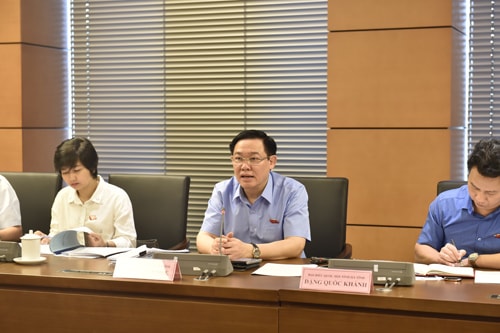
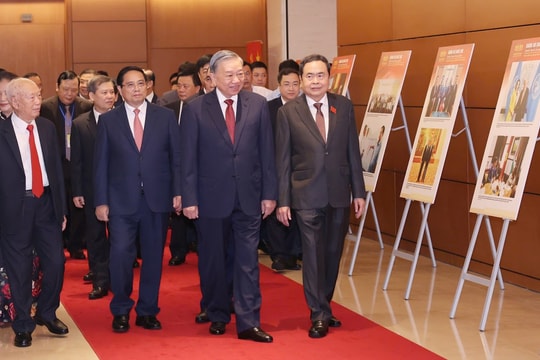
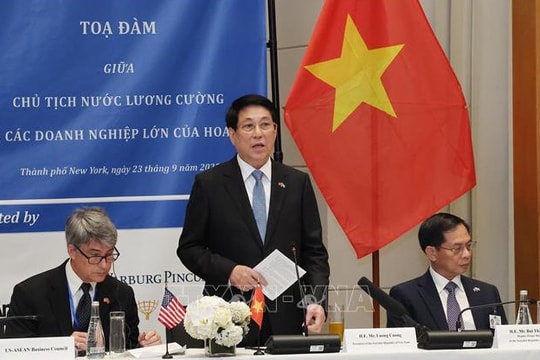
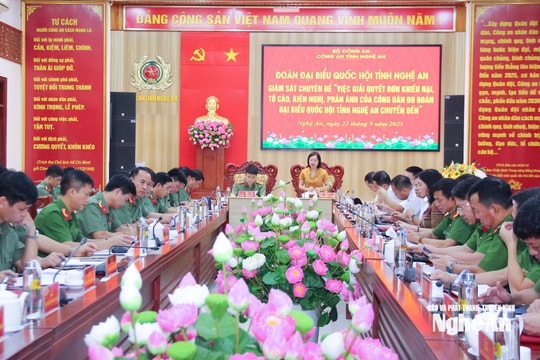
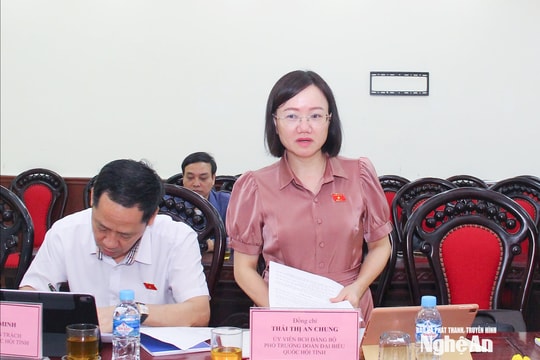

.jpg)
